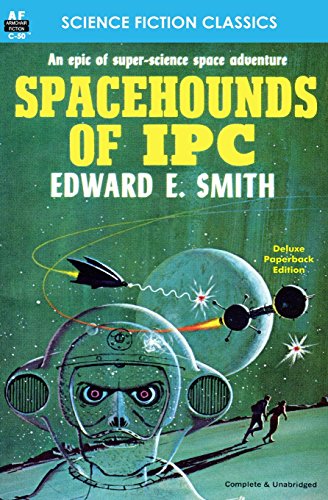 E.E. "Doc" Smith is famous for the Lensman series, but he's got plenty of other books that one rightly considers Space Opera. Most will point you to his Skylark series, but today I'm pointing you to a 1931 serialized story turned into a 1947 stand-alone novel: Spacehounds of IPC.
E.E. "Doc" Smith is famous for the Lensman series, but he's got plenty of other books that one rightly considers Space Opera. Most will point you to his Skylark series, but today I'm pointing you to a 1931 serialized story turned into a 1947 stand-alone novel: Spacehounds of IPC.
This is Space Opera that isn't interstellar, which doesn't change the quality at all; as with the Gundam franchise, you get all of the fantastic elements without needing to go outside the solar system. (Which is further than most Gundam shows, which don't even leave the Lunar Sphere.) The characters aren't larger-than-life like a Lensman is, but they're clearly heroic and the stakes are plenty big. The events have their reversals and diversions before finally coming to a satisfying conclusion.
The big takeaway from this book is this: Space Opera doesn't have to be an epic against a Dark Lord to be proper Space Opera. How big a story's adventure is depends on the characters concerned. Lensmen have to operate on galactic scales because they're superheroic in scale, scope, and power whereas the characters of this story are what TV Tropes calls "Badass Normal": otherwise ordinary people possessed of heroic resolve and determination. You don't need to blow up the Death Star to have a valid Space Opera; indeed, that's getting lazy about it.
The second takeaway is this: you can have a thrilling Space Opera where the plot does revolve around technical issues directly relevant to the plot, using it in place of a quest-style McGuffin to drive the plot forward. Much of this story's driving force comes from dealing with the initial incident that strands the characters in their dangerous environment, fixing what can get fixed and assembling components to solve another plot-relevant problem. How? By using each part of the problem-solving process to frame the next part of the adventure and introduce the next revelation in the narrative. You don't need to use The One Plot.
The third takeaway is this: you need not fear the technologies said to short-circuit a plot. The characters, being in a Lost In Space scenario, do the smart thing and put together a device that can allow them to call for help. Then they do so, and pass on all they know of the villains to the rescue team. No Idiot Balls Required!
Learn from the masters, because--contrary to the Pink Slime Cult's dogma of "Newer Is Better"--Culture is NOT Technology- "Progress" DOES NOT APPLY! E.E. Smith is the basis for ALL Space Opera, so learn how to do it from the man who made it. As the Gundam franchise's enduring success and popularity shows, Space Opera that isn't interstellar is still Space Opera and can easily acquire and retain a large, loyal, and global audience.
No comments:
Post a Comment
Anonymous comments are banned. Pick a name, and "Unknown" (et. al.) doesn't count.